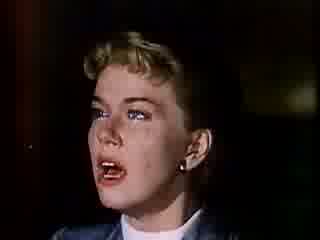Réalisation:
Alfred HitchcockPhotographie:
Robert BurksMusique:
Bernard HerrmannActeurs·trices:
James Stewart, Doris Day, Brenda De Banzie, Bernard Miles, Ralph Truman, Alan Mowbray, Hillary Brooke, Reggie Nalder, Yves Brainville (plus)Résumés(1)
En vacances au Maroc avec sa femme et son fils, le Dr. McKenna fait la connaissance d'un Français qui sera assassiné sous leurs yeux le lendemain de leur rencontre. Quelques heures plus tard, leur fils a été enlevé et vont devoir mener leur enquête... (Swashbuckler Films)
Critiques (2)
Knowing the original 1934 version, this version of The Man Who Knew Too Much is obviously much better. It's got all the attractions, it's colorful, it's widescreen, the theme song is very catchy and it stars the impeccable James Stewart (yes, he's the one who carries the film like no other). Nevertheless, or maybe because of that, I have been looking very critically at all the changes, the differences, and whether they are justified and whether they work ideally. The truth is that while Hitchcock was in England, he longed for Hollywood; when he conquered it, he became a walking advertisement for England. The new treatment is much more professional, but there are still places that are illogical, unintentionally comical and self-serving. The scene at the Royal Stuart Hall is nonetheless spectacular and Jimmy is by far the best actor Hitchcock has ever worked with. Yet the motivations of some of the characters are charmingly naive, and the development of the situation goes on and on only for us to see the relatives joke at the end. If someone wants to get somewhere, we’ll help him get there - to expect anything else would be the viewer's ignorance.
()
A masterpiece with all the trimmings. You couldn't cut the tension, as it's practically omnipresent, not least because Hitchcock cared about the characters as much as he did. James Stewart trying in vain to sit down in a Moroccan restaurant and then struggling with the food, Doris Day singing and dancing with her son, these are all such beautiful moments that make the characters just grow on us so much that we don't even hold our breath waiting for the cymbals during a riveting scene at the Royal Albert Hall.
()

